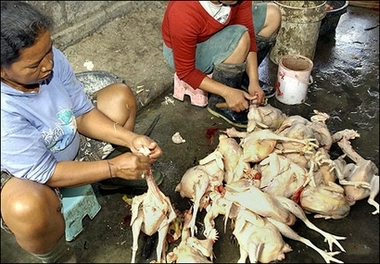Asia-Pacific
Indonesia records 43rd bird flu death
(AP)
Updated: 2006-08-08 09:20
 |
Large Medium Small |
JAKARTA, Indonesia - A 16-year-old boy in Indonesia has died from bird flu, officials said citing local test results that, if confirmed, would the death brings the country's tally to 43, the highest in the world.
 Workers prepare chicken at a livestock market for sale in Denpasar, on Bali island. A 16-year-old Indonesian has died from bird flu, a health official said, citing local test results which are usually reliable.[AFP] |
Normally reliable tests performed at a local laboratory showed that the boy who died late Monday had the H5N1 virus, said Dr. Santoso Suroso, the director of the capital's infectious diseases hospital.
The boy, whose name was not released, was admitted to hospital on Saturday.
Health officials said he had come into contact with sick chickens at his home, just east of Jakarta.
If confirmed by a World Health Organization-accredited laboratory, the death will be logged as Indonesia's 43rd from the H5N1 virus since July 2005, a third of which occurred this year.
Neighboring Vietnam is the second worst hit at 42, but it has not recorded any deaths in 2006.
The H5N1 virus has killed at least 135 people worldwide since it began ravaging Asian poultry stocks in late 2003, according to WHO. That figure does not include Monday's death in Indonesia.
Most human cases have been traced to contact with infected birds, but experts fear the virus _ which remains hard for people to catch _ will mutate into a form that spreads easily among people, potentially sparking a pandemic.
Experts say Indonesians will continue to die until the nation stops the rampant spread of infection among its hundreds of millions of backyard poultry.
"You've got to worry about the humans, but if you don't clean up the animals, it doesn't matter what you do," Dr. Anthony Fauci, the U.S. National Institutes of Health's infectious disease chief told The Associated Press by phone.
Vietnam largely controlled the spread of the virus by launching a nationwide mass vaccination campaign in poultry last year. Thailand, which has reported 16 deaths, relies on strong village-based surveillance and mass slaughtering when outbreaks are discovered.
Bird flu in Indonesia grabbed the world's attention in May when seven members of a single family died of the virus - the largest recorded cluster to date. The WHO concluded that limited human-to-human transmission likely occurred, but the virus did not spread beyond the blood family members.